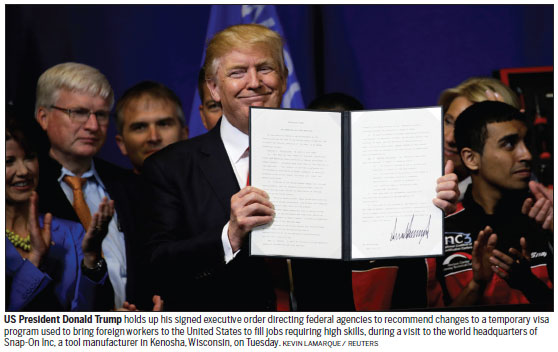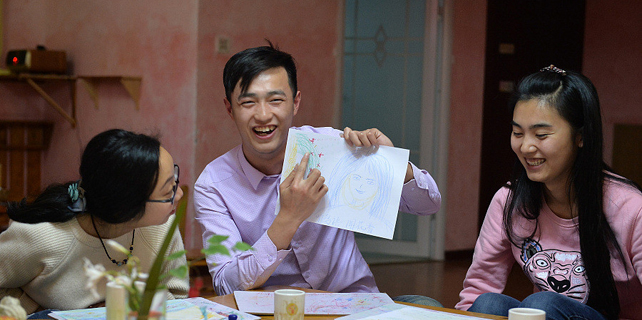H-1B to change to protect American worker

Trump's order looks to favor highly skilled and paid, stem job displacement
US President Donald Trump on Tuesday signed an executive order that could tighten the HB-1 immigrant visa program that is popular with skilled workers from India and China.
He signed the order on a visit to the headquarters of Snap-On Inc, a tool manufacturer in Kenosha, Wisconsin, saying that H-1B visas should "never be used to replace Americans", adding that "we are about to take bold new steps to follow through on my pledge to buy American and hire American".
"Right now, widespread abuse in our immigration system is allowing American workers of all backgrounds to be replaced by workers brought in from other countries," he said.
The order prods the Justice Department and other federal agencies to propose reforms to ensure H-1B visas are awarded to the most skilled or highest paid foreign applicant.
Called by the White House as the "Buy American and Hire American" order, it also directs a separate review of government purchasing requirements, which, along with tightening the requirements for foreign workers, is a move by Trump to carry out his "America First" campaign pledge. With no major legislative achievements thus far, Trump has turned to issuing a variety of executive orders to try to fulfill promises he made in his election campaign.
Created in 1990, H-1B enables US companies to sponsor non-immigrant visas to temporarily employed foreign workers with bachelor's degrees in areas like computer programming, engineering and science. The visas are in high demand and given out by lottery. It can take six months or longer for an application to be reviewed.
The US sets an annual cap of 85,000 H-1B visas, which includes 20,000 for foreign workers with advanced degrees. Less than a week after the application period opened for 2017 H-1B visas, the annual cap was reached from a pool of 199,000 applications the US Citizenship and Immigration Services said earlier this month.
"Chinese petitions comprise about 5-10 percent of the H-1B pool, which is a distant second to India, which comprises approximately three quarters of all petitions mostly for tech jobs," New York-based immigration attorney Jae Lee said in an email.
Lee said Trump's executive order calls for a review of the current lottery system of choosing petitions in favor of a merit-based one. A merit-based system would make getting an H1-B visa more competitive, giving priority to the highest-paid or most-skilled workers. Such a system may also level the playing field for applicants from countries other than India, whose technology outsourcing firms dominate the applicant pool each year, according to Lee.
Going to a merit-based system "would ensure that only the most-skilled or highest-paid foreign workers would be chosen, incentivizing companies to look to hire American workers first," said Lee.
There have been news reports of US companies hiring foreign workers to replace Americans because they earn less. In 2015, approximately 30 technology employees at Disney/ABC Television in New York and Burbank, California, were told they would be laid off, and that during their final weeks they would have to train immigrants brought in by an outsourcing company to do their jobs.
The training began, but after a few days it was suspended with no explanation. Later managers told the Disney employees that their layoffs were canceled, according to The New York Times.
However, some groups are urging caution when changing H-1B. The American Immigration Council (AIC) notes on its website "that in today's labor market, foreign workers fill a critical need - particularly in the science, technology, engineering, and math (STEM) fields."
Technology companies, particularly those in California's Silicon Valley, said they can't find enough qualified Americans to fill the technical jobs the firms are creating.
California state Assemblyman Evan Low, a Democrat who represents Silicon Valley, said: "America is a nation of immigrants. We thrive when the best and the brightest from around the world have the opportunity to bring their expertise to our country. Preventing highly skilled and talented individuals from working in our country could stifle the innovation and talent that makes our country great."
Stephen Yale-Loehr, a professor at Cornell University's law school, said the new executive order is an overly simple solution to a complex problem.
"We should vigorously enforce our immigration laws to make sure companies pay the correct wage, but not harm innovation in the process. Studies show that for every H-1B position requested, US technology companies increase their employment by five workers. Research also finds that 51 percent of the country's $1 billion startup companies had at least one immigrant founder," he said in a statement.
"I don't think this executive order can change the way the H-1Bs are allocated under this year's cap," said Cyrus Mehta, an immigration attorney and law professor at Brooklyn Law School. "You cannot just change the law midstream and give consideration to higher-wage earners."
June Chang and Lia Zhu in San Francisco contributed to this story.
paulwelitzkin@chinadailyusa.com









